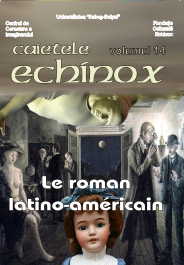Cultural Anthropophagy – A Poetic Counter-Ideology Pau Modernism – Futurism’s Re-signification
Cultural Anthropophagy – A Poetic Counter-Ideology Pau Modernism – Futurism’s Re-signification
Author(s): Rodica IlieSubject(s): Literary Texts
Published by: Universitatea Babeş-Bolyai
Keywords: Brasilian Modernism; Paulo Prado; Graça Aranha; Menotti del Picchia; Oswald de Andrade; Manuel Bandeira; Mário de Andrade; Cultural Antropophagy; Avant-garde Counter-utopia.
Summary/Abstract: In Brazilian modernism, the anthropophagic movement illustrates a tendency of aesthetic emancipation, sustained by a native, mythical- Indian imaginary and by a rhetoric that is in competition with the nationalist xenophobic movements of the time. The antropophagy movement is in polemic with the xenophobic movements, as it is towards the pattern of Italian futurism. The artistic conception of Oswald de Andrade, Mario de Andrade, Raul Bopp is profoundly critical, ironically reactive towards the themes of exotism, primitivism, colonialism, considered from the European perspective. Thus the theoretical-pragmatic writings, as well as the literature of these writers will be defined by reversing the cultural signs, the ideology of the art produced from the Enlightenment period until the avant-gardes of the XX century. The philosophy of „Pau brasil” and of cultural anthropophagy substitutes the auroral visions specific to Enlightenment, romanticism, the visions of French primitivism and Italian futurism with an original Weltanschauung, specific in fact to a split , antitraditional consciousness which, paradoxically, is defined by ancient tradition, by the pattern of the old mythological representations. This dystopic theoretical consciousness is, at the same time, the founder of a regressive utopia, with a nationalist tint (through its chthonian thematic, the creative laziness, the nativist abundance and sensuality, the still alive rites and myths).Contesting the value of exchange, of cultural import, but at the same time based on its reversal and reconversion, deteriorating its colonizing meaning and formative significations, the movement sustained by the Antropophag Manifesto imposes not only a native culture of authentic freedom, but also a counter-culture, anti-Christian and anti-European, antiacademic and anticonservative, a culture of learned freedom, acquired through the exercise of the retort, this culture being explicable through the theoretical metaphor of the voluntary devouring, aware of the European paradigm.
Journal: Caietele Echinox
- Issue Year: 2008
- Issue No: 14
- Page Range: 68-78
- Page Count: 11
- Language: English
- Content File-PDF

